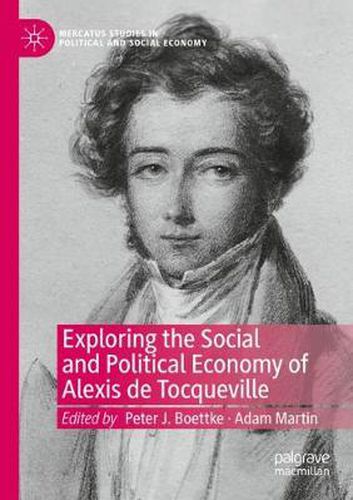Readings Newsletter
Become a Readings Member to make your shopping experience even easier.
Sign in or sign up for free!
You’re not far away from qualifying for FREE standard shipping within Australia
You’ve qualified for FREE standard shipping within Australia
The cart is loading…






This title is printed to order. This book may have been self-published. If so, we cannot guarantee the quality of the content. In the main most books will have gone through the editing process however some may not. We therefore suggest that you be aware of this before ordering this book. If in doubt check either the author or publisher’s details as we are unable to accept any returns unless they are faulty. Please contact us if you have any questions.
Alexis de Tocqueville’s work touched upon an exceptionally broad range of social scientific disciplines, from economics to religion, and from education to international affairs. His work consistently appeals to scholars dismayed by existing disciplinary silos. Tocqueville is also well-regarded for diagnosing both the promise and perils of democratic life. Consideration of his ideas provokes serious consideration of and engagement with contemporary trends as citizens in democratic countries cope with challenges posed by new technological, cultural, and political changes. However, attention to Tocqueville is uneven across disciplines, with political theorists paying him the most heed and economists the least. This volume focuses on political economy, trying to bridge this divide.
This book collects essays by emerging scholars from a variety of disciplines-political science, economics, sociology, philosophy, and social thought-to examine Tocqueville’s thoughts on political and social economy and its contemporary relevance. The book is divided into two halves. The first half engages with the main currents of research on Tocqueville’s own thoughts regarding economic institutions, constitutionalism, liberalism, history, and education. The second half applies Tocqueville’s insights to diverse contemporary topics including international relations, citizenship, mass incarceration, and pedagogy. This volume will be of interest to scholars and students interested in Tocqueville, the history of political thought, and a variety of current policy issues.
$9.00 standard shipping within Australia
FREE standard shipping within Australia for orders over $100.00
Express & International shipping calculated at checkout
This title is printed to order. This book may have been self-published. If so, we cannot guarantee the quality of the content. In the main most books will have gone through the editing process however some may not. We therefore suggest that you be aware of this before ordering this book. If in doubt check either the author or publisher’s details as we are unable to accept any returns unless they are faulty. Please contact us if you have any questions.
Alexis de Tocqueville’s work touched upon an exceptionally broad range of social scientific disciplines, from economics to religion, and from education to international affairs. His work consistently appeals to scholars dismayed by existing disciplinary silos. Tocqueville is also well-regarded for diagnosing both the promise and perils of democratic life. Consideration of his ideas provokes serious consideration of and engagement with contemporary trends as citizens in democratic countries cope with challenges posed by new technological, cultural, and political changes. However, attention to Tocqueville is uneven across disciplines, with political theorists paying him the most heed and economists the least. This volume focuses on political economy, trying to bridge this divide.
This book collects essays by emerging scholars from a variety of disciplines-political science, economics, sociology, philosophy, and social thought-to examine Tocqueville’s thoughts on political and social economy and its contemporary relevance. The book is divided into two halves. The first half engages with the main currents of research on Tocqueville’s own thoughts regarding economic institutions, constitutionalism, liberalism, history, and education. The second half applies Tocqueville’s insights to diverse contemporary topics including international relations, citizenship, mass incarceration, and pedagogy. This volume will be of interest to scholars and students interested in Tocqueville, the history of political thought, and a variety of current policy issues.